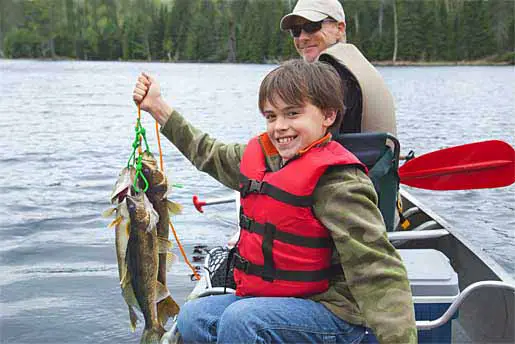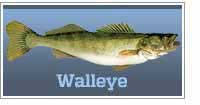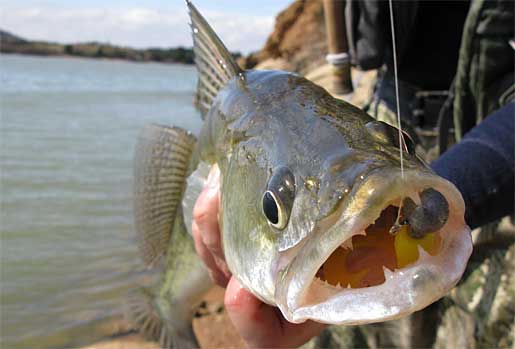Fishing for Walleye by Season
Last updated on .
Important Key Factors For Finding Walleye
- Walleye feed year round.
- Generally walleye feed morning, evening and during the night.
- Walleye are primarily a deep, cool-water species.
- Walleye move shallow to eat and spawn.
- Water temps in the high 50s to low 70s in Spring, trigger the spawn.
- Walleye cruise to find prey, rather than hold and ambush.
- Walleye prefer low-light conditions.
- Walleye feed on minnows, small fish, insects and crustaceans
- Walleye prefer small, slow-moving baits, or live bait
- See seasonal tactics below

Walleye
Stizostedion vitreum

Prefers slightly stained to murky water with little or no current. Ideal water temperature: 38° to 60°
world record: 25 pounds, 0 ounces
Seasonal Migration
Time frames and locations vary, especially north to south. However, if you adjust these principles to your local seasons, here is where you should find walleye hanging out in local waters.

March, April & May - Early Spring
Activity: Pre-spawn, and spawn. Walleye move shallower (10' to 15' deep) when water temperature rise into the mid-40s. As water temperatures warm further, they move into 3 to 6 feet of water to spawn.
Location: Prespawn 10' to 15', 3' to 6' to spawn in most bodies of water, on a rocky or gravel bottom.
Tactics: Work a variety of lures in the spawning areas, and keep changing baits - even if one bait is working well.
Best Lures: Minnows, leeches, shallow running crankbaits, jigs, rip baits and swimbaits
May & June - Spring
Activity: Post spawn
Location: 10' to 15' of water on gravel or rock points, flats and ledges. Flowing water next to these areas increase the odds of walleye being present.
Tactics: Locate bait, nearby the spawning areas, and you'll have likely found aggressively feeding walleye in the area.
Best Lures: Most every walleye lure will work during this time, but jigs tipped with live bait, and minnow-like reaction baits, tend to top the list.
June, July & August - Summer
Activity: Cruising around, looking for bait, and actively feeding in low-light conditions.
Location: 5' to 30' of water near drop offs. Weeds and vegetation enhance the summer holding and feeding areas.
Tactics: Nights, dusk and dawn are the most active periods. Wind and cloud cover can enhance daytime bites.
Best Lures: Reaction baits for shallower fish. Jigs, minnows, jigging spoons, bottom bouncers and trolled lures/baits for deeper fish.
September & October - Autumn
Activity: Migrating from deeper, summer holding/feeding areas toward the shallows early in Fall, then working deeper to winter haunts.
Location: 10' to 25' or deeper, depending on options available.
Tactics: Jigging spoons, and live bait are top producers.
Best Lures: Jigs, minnows and spoons.
November, December, January & February - Winter
Activity: Primarily staying deep, close to the bottom, and moving very slowly.
Location: 20' to 50' or deeper, depending on options available. Much of the northern walleye waters are iced over in winter, which typically does not drastically alter their location choices.
Tactics: Finding the perfect depth is key, so experiment. Find the baitfish and you'll likely find walleye. Generally shallower in the morning and evening, deeper during mid-day hours. Slow presentations are likely to trigger more bites than aggressive lure actions. See ice fishing for walleye in lakes that freeze over.
Best Lures: Minnows, spoons, small jigs and ice jigs
Related Articles
Walleye, sauger or saugeye fishing waters by state
021926
Fishing Information



